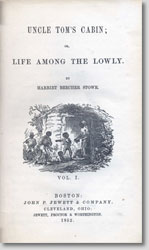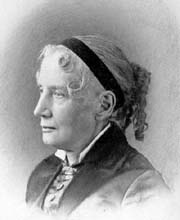“A mighty influence is abroad, surging and heaving the world.” – Harriet Beecher Stowe, March 20, 1852
 When President Abraham Lincoln welcomed Harriet Beecher Stowe to the White House in 1862, he reportedly greeted her with the words, “So this is the little lady who made this big war?”
When President Abraham Lincoln welcomed Harriet Beecher Stowe to the White House in 1862, he reportedly greeted her with the words, “So this is the little lady who made this big war?”
If in fact Lincoln did say this to Stowe, he certainly meant it with teasing admiration. For while there were many others whose writing was influential in shaping anti-slavery sentiment in the United States, none had as great an impact in the decade leading to the Civil War as “the little lady” who wrote Uncle Tom’s Cabin.
Harriet Beecher was born on June 14, 1811 in Litchfield, Connecticut. She grew up in New England before moving as a young woman to Cincinnati, where her father Lyman, a prominent Presbyterian minister, had become president of Lane Theological Seminary. During the nearly twenty years she lived in southern Ohio, Harriet became well-acquainted with the experiences of former slaves from the neighboring slave state of Kentucky. In 1836 she married widower Calvin Stowe, an abolitionist professor with whom she would have seven children.
 Stowe was a talented writer who composed poems, children’s books, and novels. Moved by her passion for the abolition of slavery, she began to write more about the moral perils of slavery and developed the idea that would later become Uncle Tom’s Cabin. On June 5, 1851, portions of the book began to appear in serial form over ten months and forty installments in the abolitionist publication, the Washington National Era. 158 years ago today, the book Uncle Tom’s Cabin was published by a Boston company and it became an instant best-seller, with 300,000 copies selling in its first year and over two million copies sold worldwide within five years.
Stowe was a talented writer who composed poems, children’s books, and novels. Moved by her passion for the abolition of slavery, she began to write more about the moral perils of slavery and developed the idea that would later become Uncle Tom’s Cabin. On June 5, 1851, portions of the book began to appear in serial form over ten months and forty installments in the abolitionist publication, the Washington National Era. 158 years ago today, the book Uncle Tom’s Cabin was published by a Boston company and it became an instant best-seller, with 300,000 copies selling in its first year and over two million copies sold worldwide within five years.
 The book told the stories of a group of slaves and it depicted the brutal physical, emotional, and moral toll slavery took on them as well as those who owned them. The power of its narrative pushed the issue of slavery even farther to the forefront of American consciousness. During the years of the book’s great success, Stowe continued to speak out against slavery throughout the North. After the war and the elimination of slavery in the United States, Stowe continued as a prolific author and a voice of moral activism. Uncle Tom’s Cabin continued to enjoy enormous popularity as well, with its portrayal on theatrical stages throughout the United States very common over fifty years after its publication.
The book told the stories of a group of slaves and it depicted the brutal physical, emotional, and moral toll slavery took on them as well as those who owned them. The power of its narrative pushed the issue of slavery even farther to the forefront of American consciousness. During the years of the book’s great success, Stowe continued to speak out against slavery throughout the North. After the war and the elimination of slavery in the United States, Stowe continued as a prolific author and a voice of moral activism. Uncle Tom’s Cabin continued to enjoy enormous popularity as well, with its portrayal on theatrical stages throughout the United States very common over fifty years after its publication.
Harriet Beecher Stowe died on July 1, 1896 in Hartford, Connecticut; her 85 years spanning almost the entire 19th century, on which her words had such profound consequence.




